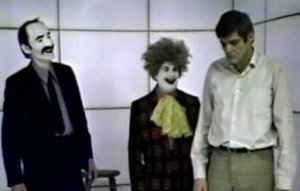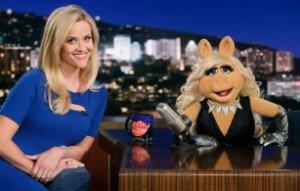The Wizard of Id, Etc.
Today, once more we have a number of shorter Henson clips to look at before returning to the first season of Sesame Street the day after tomorrow. We begin with The Wizard of Id, a brief pilot based on the famous comic strip by Johnny Hart and Brant Parker, which was first launched in 1964 and continues to run to this very day. Although the show never came to be–apparently by the time the creators of Id started to demonstrate interest in the project, Jim already became too busy with Sesame Street and other projects–it’s significant as being the first time that Jim and his team ever designed puppets based on someone else’s work. Here, it was three puppets designed to look like characters from the strip.
One could also see why Jim might have been less interested in it because it wasn’t his own work. The script also isn’t as inspired as those written for his own characters and feels very much like short back-and-forth comic strip scenes brought to life in succession. It’s even entirely possible that they did just use lines from the original strips, but either way it has a rather choppy quality. Now, it’s also possible that that is because this was just a brief 5-minute pilot and they would have broken out of this format had they filmed a full episode or went to series. But as it is, this feels more like a curiosity than a truly intriguing what-might-have-been such as Tales of the Tinkerdee is. It does, however, end on a cute bit in which the Wizard blows up each of the characters, then himself, saying: “Yes, sir, it’s a standard Muppet finale. If you don’t know how to end it, go out with a–” BANG!
Read More
The Cube
In 1966, around the time that Jim Henson and Jerry Juhl wrote Tale of Sand, they collaborated on another script called The Cube, which Jim described as an “original surrealistic comedy…[that] dramatizes the complex, baffling problems of reality versus illusion,” a description that could have easily been applied to Tale of Sand, as well. Like that unproduced script, it centers on a single man who finds himself in a strange place with no explanation of how he got there, basically being relentlessly assualted and harassed by a variety of bizarre characters, driven further and further over the edge, and finally, just when he thinks he’s conquered his demons, ending up right where he started again with no end or escape in sight.
Read MoreNBC White Paper Credits
A little later today, we are finally going to explore the origins of one of Jim’s most famous, enduring projects, Sesame Street, but firstly, a brief bit of non-Muppets footage. Earlier in 1968, NBC had been extremely impressed with Jim’s Youth 68 documentary and so hired him to create a credits sequence for a three-part documentary series called Ordeal of the American City, which was itself part of an NBC news series called NBC White Paper. And here is the footage, which follows Jim’s penchant for juxtaposing quick shots to create an overlapping collage effect. Here, the images are all urban in nature, the images being used to underline the fraught tensions underlying city life:
Read More
Hey Cinderella!
Hey Cinderella! is an hour-long fractured fairy tale that was the Muppets’ first network television special and the first entry in a thematic trilogy dubbed Tales from Muppetland. Although it didn’t air until April 1970, about 5 months after Sesame Street‘s first season debuted, it was actually filmed in 1968 in Toronto, and its history reaches back further than that.
In 1965, TV writers Jon Stone (who we saw in Ripples) and Tom Whedon (father of Joss Whedon) wrote a pilot script for CBS for a show that was meant to be centered on Snow White, co-starring the Muppets. CBS passed on the script before a pilot was even shot, but ABC thought the idea had potential, as long as it was about a different fairy tale, for
Read MoreThe Muppets 1.05: “Walk the Swine”
I had been eagerly anticipating Reese Witherspoon’s visit to The Muppets for quite a while. As a small, plucky, determined, blonde Hollywood star with an unexpected edge (and documented diva behavior, at times), she seemed the perfect foe for Piggy, and while it would be nice to eventually see Piggy cross paths with another female star who she doesn’t harbor jealousy or resentment towards, Piggy never has been the plays-well-with-others-who-seem-like-they-might-try-to-hog-her-spotlight type.
Particularly in this case, for, as we learn in this episode, Piggy was also up for the role of June Carter Cash in Walk the Line but lost out to Reese who–to add insult to injury–then had the gall to win an Oscar for it. Kermit
Read More


